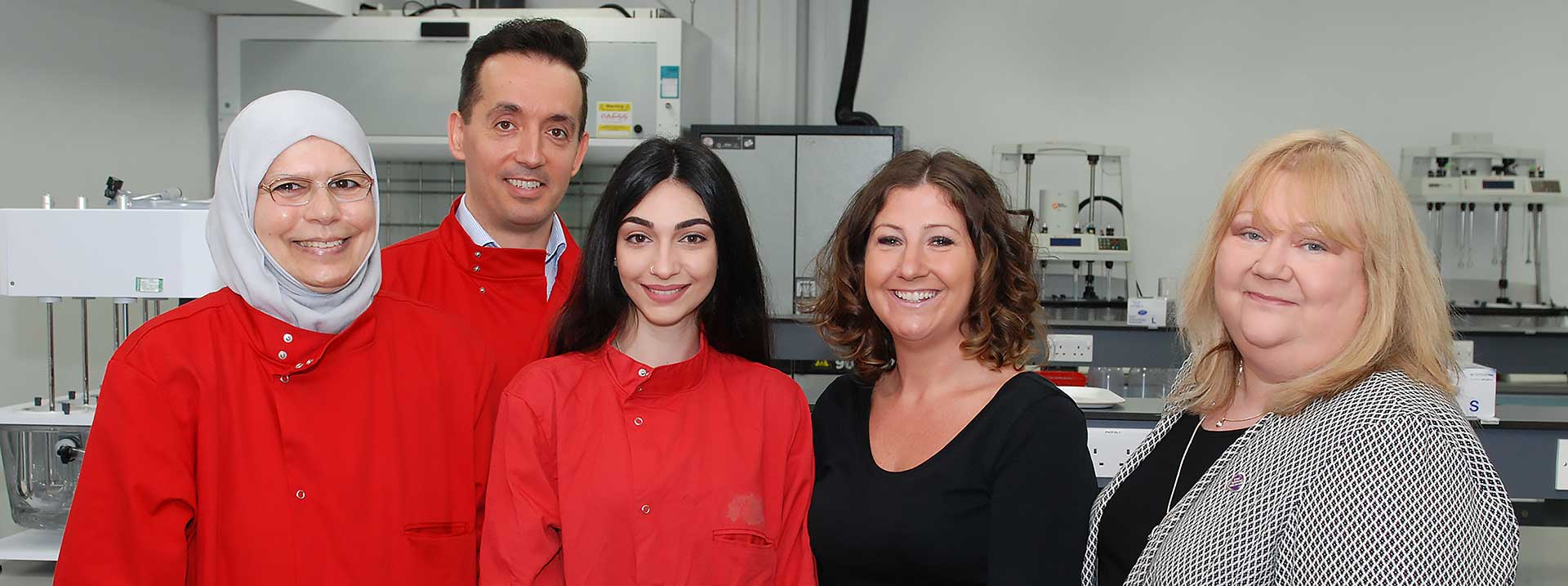By special invitation PhD researcher Myria Ioannou, who is funded by the Laura Crane Youth Cancer Trust, has written a journal article featuring the University’s research into cancer destroying protein molecule CD40 and the methodology used to focus the research towards fighting cancer in young people
 Helen Mervill (second right) and Pam Thornes (far right) of the Laura Crane Youth Cancer Trust paid a visit to (left to right) post-doctoral research associate Khalidah Ibraheem , Dr Nik Georgopoulos and the funded PhD researcher Myria Ioannou, who is focusing the CD40 research on youth cancers.
Helen Mervill (second right) and Pam Thornes (far right) of the Laura Crane Youth Cancer Trust paid a visit to (left to right) post-doctoral research associate Khalidah Ibraheem , Dr Nik Georgopoulos and the funded PhD researcher Myria Ioannou, who is focusing the CD40 research on youth cancers.CANCER researchers at the University of Huddersfield are currently developing new treatments specifically for young people and the research caught the attention of an international peer-reviewed journal, who invited the University to publish an article on the development of the research and methodology.
Dr Nik Georgopoulos, a specialist in cancer research at the University’s School of Applied Sciences, was approached by the editorial team of Bio-protocol after they read about his research based on the protein molecule named CD40 (Cluster of Differentiation 40), which can destroy cancerous tumours without harming healthy cell tissue.
Cancer treatment free from harmful side-effects
His laboratory has identified unique experimental methodologies to activate the CD40 protein on tumour cells and these methodologies are now going to be extensively reported in the journal.
Dr Georgopoulos’s most recent research, published in the Nature group peer-reviewed journal Oncogene, could ultimately lead to a new form of cancer treatment free from the harmful side-effects often experienced with treatments such as chemotherapy and radiotherapy.
This is made possible because when tumour cells continuously divide they are placed under considerable “stress” and as a coping strategy they develop protective properties.
Activation of the CD40 protein molecule removes this protection, so that the tumour cells die and, because normal cells are not placed under the same “oxidative stress”, they are left unharmed by the molecule.
The Laura Crane Youth Cancer Trust
Working alongside him is PhD researcher Myria Ioannou, who began her doctorate at the University last year after the Huddersfield-based Laura Crane Youth Cancer Trust provided financial backing to fund a specially-appointed doctoral researcher to investigate at how the new treatment regime can be targeted towards fighting cancer in young people.
The Laura Crane Youth Cancer Trust is focused on funding medical research into cancers specifically affecting teenagers and young adults. By creating the Jacquie Roeder Research Fund, the charity will now donate £100,000 over the next three years to facilitate the project.
Myria is the main author of the article that was recently published by the online journal Bio-protocol and said she is proud to be conducting research that could improve the lives of young cancer sufferers and the work is made all the more pertinent as she is in the same age group as the young people on whom she is conducting the research.
New youth cancer research is vital
Pam Thornes, Trust Manager from the Laura Crane Youth Cancer Trust and Helen Mervill, Fundraising Manager, visited the University to meet Myria and said that finding less harmful cancer treatments is vital because the current side-effects are often debilitating and destroy a young person’s quality of life.
“The fact that this research is happening on our doorstep is fantastic,” said Helen. “Working with young cancer patients, we see for ourselves the degree at which cancer treatment affects their immediate lives and even later on in life.
“The University is researching a treatment that doesn’t attack healthy cells, which is really exciting because it means the side-effects for certain cancers has the potential to become a thing of the past,” she added.
Related news
Scientists discover how molecule destroys cancer
The University's scientists have discovered how a molecule destroys cancerous tumours without harming healthy cell tissue
Uni scientists to work with local cancer trust
Huddersfield scientists will work with The Laura Crane Youth Cancer Trust to develop a treatment for cancer in young people
Video explains the properties of molecule CD40
A video briefly explaining the discovery of the properties behind CD40 and what is going to happen now
